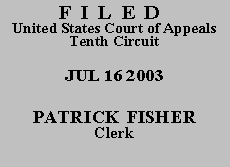

| DONALD E. SMITTLE, Trustee for
Donald E. Smittle Loving Trust,
Plaintiff-Appellant, v. FIDELITY BROKERAGE SERVICES, LLC; SECURITIES AND EXCHANGE COMMISSION; WILLIAM B. FEDERMAN; STUART W. EMMONS; FEDERMAN & SHERWOOD; MARK E. NOWICKI; JOHN R. PRESTON; THOMAS A. BAMBURGER; ROGER D. MINNEY; NASD DISPUTE RESOLUTION, INC., Defendants-Appellees. |
|
Plaintiff Donald E. Smittle, appearing pro se, appeals the district court's order dismissing, without prejudice, his motion to vacate an arbitration award for lack of subject matter jurisdiction. We affirm.
Plaintiff filed an arbitration claim against Fidelity Brokerage Services, L.L.C. (Fidelity) with the National Association of Securities Dealers (NASD), claiming that Fidelity had arbitrarily and negligently revoked all margin in his brokerage account. The NASD arbitration panel dismissed plaintiff's statement of claim. Plaintiff then filed a motion to vacate the arbitration decision in the United States District Court for the Western District of Oklahoma, claiming the arbitration award was "irrational, arbitrary, and capricious, with no basis in evidence, and in contradiction of undisputed facts." R. Doc. 1, at 5. Although his arbitration claim named only Fidelity as a broker, his motion to vacate also named the attorneys who represented Fidelity, the Securities and Exchange Commission, the NASD case administrator, the three NASD arbitration panel members and NASD Dispute Resolution, Inc.
For substantially the same reasons set forth by the district court in its thoughtful and well-analyzed order, we agree that subject matter jurisdiction is lacking. As the district court correctly noted, because the Federal Arbitration Act "does not create any independent federal-question jurisdiction," the party seeking confirmation must demonstrate a jurisdictional basis under either 28 U.S.C. § 1331 (federal question) or § 1332 (diversity). P & P Indus., Inc. v. Sutter Corp., 179 F.3d 861, 866 (10th Cir. 1999) (quotation omitted). Plaintiff's complaint failed to allege any colorable federal question. See Martinez v. United States Olympic Comm., 802 F.2d 1275, 1280 (10th Cir. 1986) (holding that "federal question jurisdiction must appear on the face of a plaintiff's well-pleaded complaint," and "[t]he complaint must identify the statutory or constitutional provision under which the claim arises, and allege sufficient facts to show that the case is one arising under federal law"). He further failed to allege diversity jurisdiction. See Wis. Dep't of Corr. v. Schacht, 524 U.S. 381, 388 (1998) (holding that "[a] case falls within the federal district court's original diversity jurisdiction only if diversity of citizenship among the parties is complete, i.e., only if there is no plaintiff and no defendant who are citizens of the same State") (quotations omitted), and Penteco Corp. Ltd. P'ship - 1985A v. Union Gas Sys., Inc., 929 F.2d 1519, 1521 (10th Cir. 1991) (holding that plaintiff "must allege in his pleading the facts essential to show diversity jurisdiction") (quotation omitted).
Plaintiff filed three post-judgment motions, which could be construed as motions for reconsideration or motions to amend. In none of these motions did plaintiff remedy his failure to allege a colorable federal-question. Nor did he remedy his failure to allege complete diversity jurisdiction or rebut the evidence that three of the defendants, William B. Federman, Stuart W. Emmons and Federman & Sherwood, are, like plaintiff, residents of Oklahoma.
Accordingly, the judgment of the district court is AFFIRMED. The mandate shall issue forthwith.
Entered for the Court
Chief Judge
*. This order and judgment is not binding precedent, except under the doctrines of law of the case, res judicata, and collateral estoppel. The court generally disfavors the citation of orders and judgments; nevertheless, an order and judgment may be cited under the terms and conditions of 10th Cir. R. 36.3.